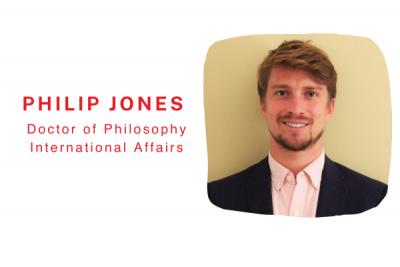The journey of pursuing a PhD is often marked by profound personal and intellectual growth, as individuals delve deep into their chosen fields of study. One such journey is that of Philip Jones, a PhD student at the Norman Paterson School of International Affairs (NPSIA), whose research focuses on the intricate dynamics of organized criminal groups, treating them as quasi-states and businesses. Through his academic trajectory at NPSIA, Philip shares insights into his research and the valuable lessons learned along the way.
 Philip’s academic journey began with an undergraduate education in Nova Scotia, followed by a master’s degree in London (United Kingdom), where he was introduced to the captivating realm of sub-national authoritarianism by a professor. This encounter sparked his fascination with the governance dynamics of non-state actors, laying the groundwork for his future research endeavors. Upon completing his master’s degree, Philip worked with an anti-corruption NGO in London, Transparency International. It was during this time that he was introduced to Jean Daudelin, a renowned scholar and associate professor at NPSIA. His guidance and mentorship inspired Philip to embark on a PhD journey at NPSIA, focusing on organized crime in Brazil.
Philip’s academic journey began with an undergraduate education in Nova Scotia, followed by a master’s degree in London (United Kingdom), where he was introduced to the captivating realm of sub-national authoritarianism by a professor. This encounter sparked his fascination with the governance dynamics of non-state actors, laying the groundwork for his future research endeavors. Upon completing his master’s degree, Philip worked with an anti-corruption NGO in London, Transparency International. It was during this time that he was introduced to Jean Daudelin, a renowned scholar and associate professor at NPSIA. His guidance and mentorship inspired Philip to embark on a PhD journey at NPSIA, focusing on organized crime in Brazil.
Reflecting on his journey, Philip acknowledges the transformative nature of his PhD experience. From the wide-eyed enthusiasm of his early years to the challenges posed by fieldwork and the unexpected disruptions of the COVID-19 pandemic, Philip’s journey has been a testament to resilience and growth. Beyond honing his research and writing skills, he emphasizes the invaluable lessons in cultural navigation, networking, and interpersonal communication that he has acquired throughout his doctoral pursuit at NPSIA.
Philip also underscores the diverse skill set cultivated during his time at NPSIA, ranging from grant writing and presentation skills to intercultural adaptability. Moreover, he acknowledges the unique opportunities afforded by the school, including its robust network of professors, connections with the public service in Ottawa, and collaborative ventures abroad. The intimate size of the program fosters a supportive environment where students receive personalized attention and mentorship, enhancing their academic and professional growth.
In parting, Philip emphasizes the importance of passion, curiosity, and resilience in the pursuit of academic endeavors. He encourages students to explore topics they are deeply passionate about, while remaining open to new avenues of discovery and embracing the journey with a sense of joy and curiosity.